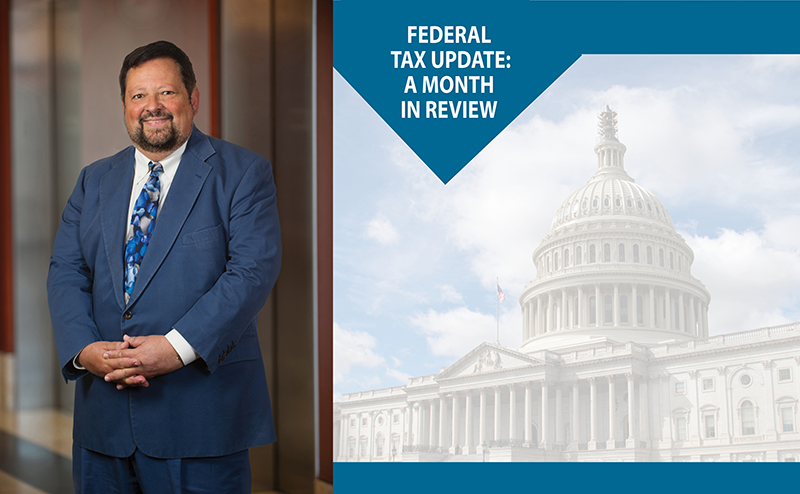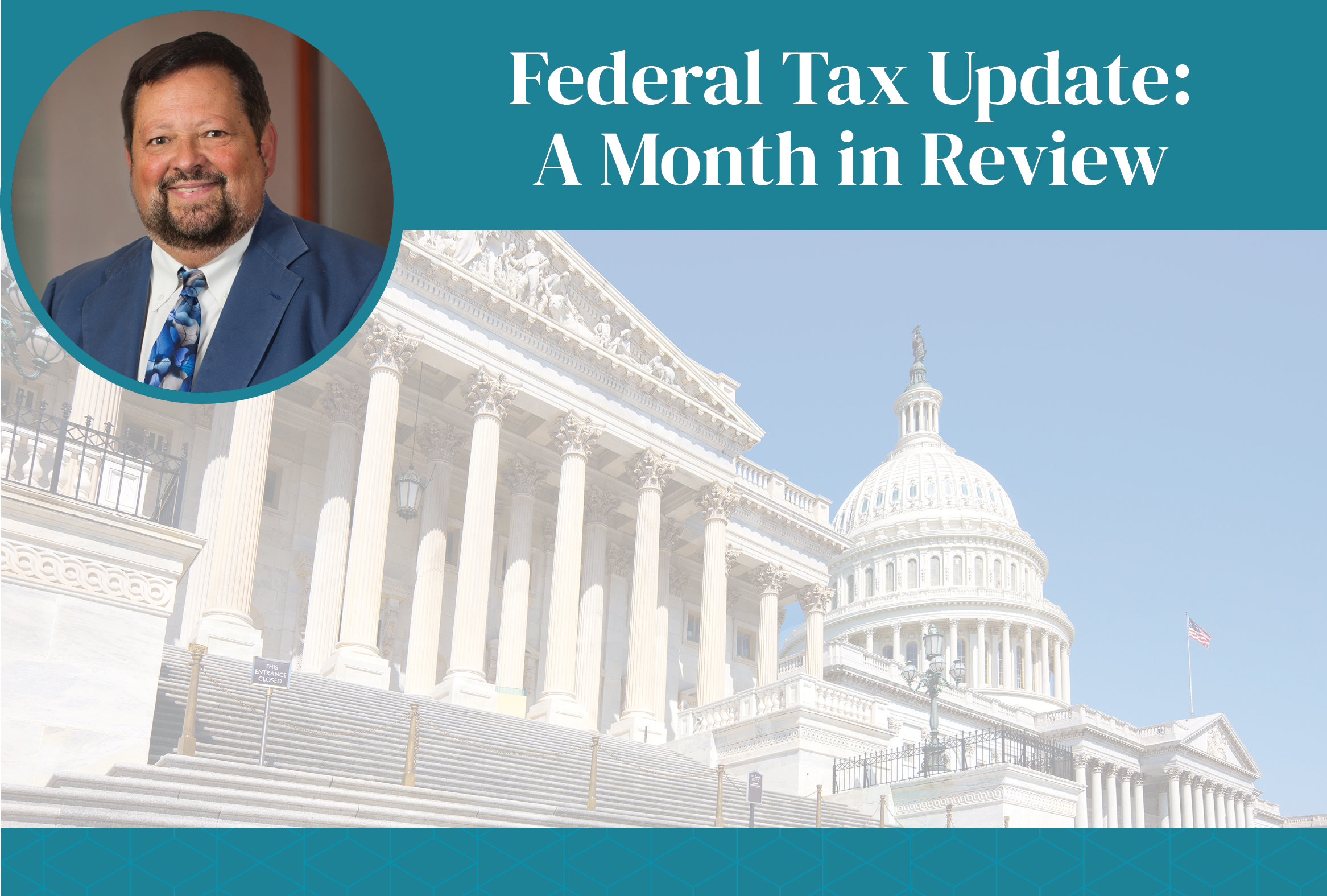March 1st, 2023
February Federal Tax Update
Posted in: Tax Law Tagged: David S. De Jong

INDIVIDUALS
In Green Rock, LLC v. Commissioner, 131 AFTR2d 2023-562, an Alabama Federal District Court joined the Sixth Circuit Court of Appeals and the Tax Court in striking down the labeling of syndicated conservation easements as abusive tax transactions for failure to comply with the notice and comments requirements of the Administrative Procedure Act.
In News Release 2023-23, IRS indicated that disaster relief payments made by 17 of 21 states do not need to be reported as income for federal tax purposes; however, those in Georgia, Massachusetts, South Carolina and Virginia may only exclude the payment if the recipient claimed the standard deduction or itemized deductions without receiving a tax benefit as payments in these states were considered a refund of state taxes paid.
RETIREMENT AND ESTATE PLANNING
In Estate of Spizziri v. Commissioner, TC Memo 2023-25, the Tax Court determined that a wealthy attorney’s payments over five years to seven women, in addition to his daughter and step daughter, were gifts inasmuch as no W-2 or 1099 was issued.
In Estate of Cecil v. Commissioner, TC Memo 2023-24, the Tax Court adopted portions of three valuation reports (two for the taxpayer and one for the IRS) in the case of a gift of minority stock in the entity owning the Biltmore property in North Carolina and (1) on the facts permitted tax effecting an S corporation; (2) rejected use of a higher valuation using the asset approach when the shares in the aggregate could not force sale of the assets and disposition was unlikely and (3) permitted a 20 percent discount for lack of control and a 19-27 percent discount for lack of marketability.
In Kalikow v. Commissioner, TC Memo 2023-21, the Tax Court concluded that an amount of $6.5 million not distributed to the surviving spouse as required by a QTIP trust and to be paid to her estate was an asset of the estate and could not be offset by a reduction in the value of the QTIP because of a prior stipulation of the QTIP’s value.
In Dillon Trust Company LLC v. United States, 131 AFTR2d 2023-605, the Court of Federal Claims concluded that a trust liable for taxes could not require IRS to levy on a successor trust to satisfy the liability as such discretion was solely on the part of IRS.
BUSINESS
In Nath v. Commissioner, TC Memo 2023-22, the Tax Court held that loans to a taxpayer from a family business were taxable on receipt as repayment was not contemplated; in any event, the taxpayer at trial called the payments advances on future earnings (which are taxable).
In Cheam v. Commissioner, TC Memo 2023-22, the Tax Court allowed a cost of goods sold deduction to be applied to a grocer’s unreported income but at 31 percent of sales based on records provided and not at the 75 percent claimed on the original returns.
In Avery v. Commissioner, TC Memo 2023-18, the Tax Court denied a personal injury attorney’s business expenses of over $300,000 related to his car racing hobby as the races were held several states away from his practice and the firm’s name on the race car was in small letters.
PROCEDURE
Final Regulations under Code Section 6045, et al. follow Proposed Regulations and for returns filed in 2024 and subsequent years require electronic filing of information returns when at least ten recipients must be identified (down from 250).
In Kemegue v. Commissioner, TC Summary Opinion 2023-5, the Tax Court concluded that an individual who cited professional and personal difficulties following the loss of her job was subject to the failure to file penalty because she gave no explanation or evidence of any specific incapacity or illness.
In Operating Engineers Local Union No. 3 v. United States, 131 AFTR2d 2023-611, a California Federal District Court ruled that a union was subject to penalty for failure to timely file, pay and deposit payroll taxes where a single person, the comptroller, who was not considered an officer or a member of its Board and was under the direct supervision of a business manager, failed to fulfill responsibilities, the Court noting that the business manager should have ensured that the comptroller fulfilled her responsibilities.
In Bittner v. United States, 131 AFTR2d 2023-________, the US Supreme Court by a 5-4 margin reversed the Fifth Circuit Court of Appeals and concluded that the $10,000 penalty for nonwillful failure to file the FBAR report was measured per annual filing and not per bank account; the courts have been deeply divided.
In Harris v. Commissioner, in a Bench Opinion the Tax Court held that IRS supervisory approval is not required of any penalty imposed by the Tax Court rather than the IRS for frivolous proceedings, those for delay and where the taxpayer unreasonably failed to pursue available administrative remedies.
In Thomas v. Commissioner, 160 TC No. 4, the Tax Court allowed IRS at trial to enter blogs of the taxpayer into evidence despite not being part of the administrative record as they were newly discovered evidence.
In Park v. Commissioner, Docket No. 3312-225, a Tax Court petition filed electronically from California and received by the Court at 12:01 a.m. eastern one day too late was thrown out on the Court’s own initiative as time of receipt in Washington, DC controls and the taxpayer was two minutes late despite alleging that the “send” button was hit on time (the taxpayer and IRS resolved the matter without the Court).
In Colasuonno v. United States, 131 AFTR2d 2023-495, a New York Federal District Court ruled that IRS could assess the trust fund recovery penalty while the individual was in a personal bankruptcy although it could not take action to collect upon the assessment.
In Brown v. United States, 131 AFTR2d 2023-________, an Arizona Federal District Court reversed a bankruptcy court and held that the since repealed shared responsibility “penalty” is really an excise tax and not a penalty and has priority in bankruptcy; the courts are deeply divided but the Supreme Court has declined to hear the issue.
In Notice 2023-21, IRS extended the deadline for refund claims for 2019 and 2020 returns, disregarding the periods from April 15 – July 15, 2020 and from April 15 – May 17, 2021.
In Chief Counsel Advice 202306008, IRS declined to let Form 4868, the automatic extension for individuals, constitute a timely claim for refund inasmuch as, while a claim need not be made on the proper form, it must have a written component and describe the basis for a refund.




